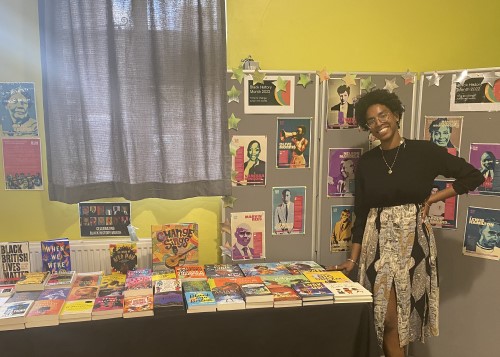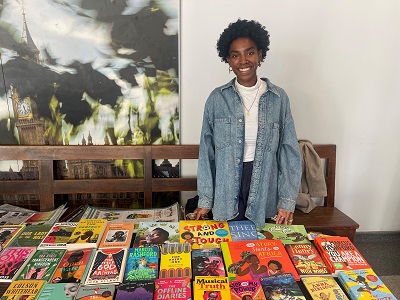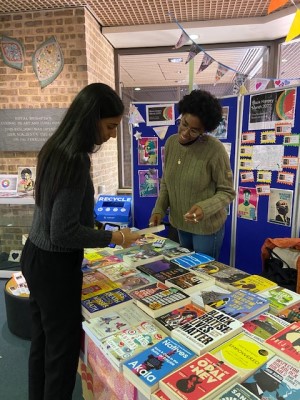
Toneé Mykoo’s job as bookseller at Round Table Books, an independent bookstore that features only books written by diverse and underrepresented authors, usually sees her working inside the Brixton-based shop. But this October, for Black History Month, Toneé (pictured above) has swapped the shelves for a modestly-sized table at our hospitals, and on it rests a hand-picked selection of books by Black authors. The intention is clear: “For people to know that these books and authors are out there,” she says.
The bookstall, which has rotated between Royal Brompton, Harefield, Guy’s Hospital, St Thomas’ Hospital, and Evelina London, has become a centrepiece for conversation, giving passers-by – and staff, in particular – the opportunity to discuss the books that have profoundly shaped their understanding of the lived experience of Black communities.
David Harewood’s 'Maybe I Don’t Belong Here' is one such book for Dr Debbie Ford, consultant clinical psychologist and staff psychology service lead. “I read this after watching 'Psychosis and Me',” says Debbie, referring to Harewood’s documentary film which sees him retrace his battle with psychosis in his early twenties.
“The picture that David paints through his book about stigma, shame and misperception – due to him being a Black man experiencing psychosis – has really stayed with me; how society can interpret intent behind a behaviour, based on the colour of skin.”
 In the UK, where Black men are ten times more likely than white men to experience psychosis, Debbie says reading about Harewood’s experience has cast yet another, glaring lens on race disparities in mental health, and the lack of access to treatment that appropriately recognises the needs of the Black community. “It made me question myself and my professional system,” she says. “I questioned the lack of practices we have in place to make it safer for all communities to access support, and for it to be delivered in a way that pays sharp attention to the intersection of race, gender, mental health and stigma.”
In the UK, where Black men are ten times more likely than white men to experience psychosis, Debbie says reading about Harewood’s experience has cast yet another, glaring lens on race disparities in mental health, and the lack of access to treatment that appropriately recognises the needs of the Black community. “It made me question myself and my professional system,” she says. “I questioned the lack of practices we have in place to make it safer for all communities to access support, and for it to be delivered in a way that pays sharp attention to the intersection of race, gender, mental health and stigma.”
As a parent, Debbie recognises the importance of inciting similar questions in the minds of children. “We have a duty to speak to our children about many topics, from race and discrimination to power and identity,” she says.
At age six, Debbie’s son was already learning about Black history and Black narratives – “We dove into multiple stories of Black figures – from Mary Seacole to Nelson Mandela to Rosa Parks” – but it was the story of Parks that particularly stirred her son. "He just could not comprehend how white people used segregation as a weapon and how people stood by and let it happen," Debbie says. "He began to talk about actions he would take if he saw that today."
Toneé, now one year into her job at Round Table Books, has noticed a clear rise in “parents consciously seeking out books that are representative of other experiences,” something she partly attributes to “conversations surrounding race becoming less taboo,” and, latterly, to the social uprising following the death of George Floyd in 2020.
For Debbie, Floyd’s death, and the Black Lives Matter demonstrations that followed, sparked yet further discussions with her son “about how racism, discrimination and fear is not over,” she says. “As a young white boy, I want him to know we need to go beyond recognising all as equal – which is still taught as a helpful approach – and know we are not.”
 But education, it would seem, has a place beyond the home and the classroom. Toneé recalls a recent encounter with a nurse who worked at a hospital in Kent. “She was embarrassed to say they had not one diverse book on the whole ward,” Toneé says. “I helped her to compile a list of representative children’s books that the hospital could order, so that the children there might equally be exposed to some beautiful books by Black, Asian and minority ethnic authors.”
But education, it would seem, has a place beyond the home and the classroom. Toneé recalls a recent encounter with a nurse who worked at a hospital in Kent. “She was embarrassed to say they had not one diverse book on the whole ward,” Toneé says. “I helped her to compile a list of representative children’s books that the hospital could order, so that the children there might equally be exposed to some beautiful books by Black, Asian and minority ethnic authors.”
Toneé knows the power books can wield on the human mind. They are, she implies, as much a window into people’s worlds as they are a door to conversation. “The more mainstream these books become, the more conversations can be started, and maybe with that, people will be more comfortable to take part in these conversations.”
She offers, however, a caveat: “There is so much heart in those stories that explore racial trauma, but if those were the only books that people read, where racism and oppression are at the centre of the narrative, people will have such a one-dimensional view of the Black experience.”
Fortunately, she’s encouraged by the greater number of “nuanced stories” taking up room on bookshelves. One of these, 'Luster', by Raven Leilani, was described by one staff member as an “unabashed, purposefully messy portrait of an anti-heroine we want to root for but who we’re not sure is always rooting for herself.”
He says the novel (about a young Black woman’s relationship with a white couple in an open marriage) invites the reader to land at the complex intersection of race, gender and class, “but the story doesn’t look to impart a lesson, nor does it necessarily want us to feel sympathetic toward Edie [the narrator], if we don’t, or if we choose not to.”
If we expect Black literature to focus on one narrative, we are, Toneé says, removing “the rights of these Black characters to live full lives – go on adventures, make mistakes, be awkward and funny, exist in fantasy worlds, or fall in love.”
Never short of a book recommendation, Toneé – while speaking with Debbie at the bookstall – suggests she and her son read 'Milo Imagines the World' by Mat De Le Pena and Christian Robinson. A picture book, its premise is simple: don’t judge a book by its cover.
“I can’t wait,” says Debbie. It will be another seed sown into a mind that, by Debbie’s own admission, thinks about race beyond how she could at his age (now eight).
The bookstalls have clearly been a success. “It’s lovely for more people to know of what we do at Round Table Books,” says Toneé, “and also for them to know that these books and authors are out there.”
To find out more about Round Table Books, visit: https://www.roundtablebooks.co.uk/
The books discussed in this article:
- Maybe I Don’t Belong Here, David Harewood
- Luster, Raven Leilani
- Milo Imagines the World, Mat De Le Pena and Christian Robinson
